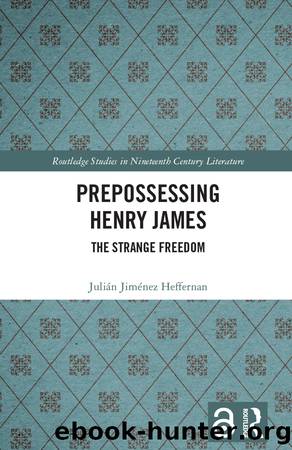Prepossessing Henry James by Julián Jiménez Heffernan

Author:Julián Jiménez Heffernan
Language: eng
Format: epub
Publisher: Taylor and Francis
Published: 2023-09-15T00:00:00+00:00
4Tessera
The Enthusiasm of Liberty: Martyrdom and Ascension in The Wings of the Dove
DOI: 10.4324/9781003199564-4
I
In the second book of The Wings of the Dove, Kate is described as the contemporary London female, highly modern, inevitably battered, honourably free (40). This is ironic, for we already know she is a developed specimen of the restricted town animal [bornierten Stadttier] (Marx and Engels, German 69), and therefore profoundly unfree. But Kate is not the only restrained creature in the novel. To show for Milly, as everyone seems to do, an unlimited interest (172), is proof of limitation, forâas Žižek and Pippin variously implyâinterest presupposes a condition of interpersonal bondage: to be interested is to be (esse) placed in between (inter) people.1 Aunt Maud and Kate can find themselves queens of infinite space, but they are bounded in a nutshell. Otherwise put, an unlimited interest is an unlimited limit. No important character in the novel is completely free. Most conform to the ur-liberal type of the self-moving, appetitive, possessive individual (Macpherson, Political 265). Kate is described as the height of the disinterested (117), and Aunt Maud as a large [â¦] capacious receptacle (120), but these are errors of transcultural appreciation, for the English ladies are fatally constrained to the commercial game of give and take (121). Others, like Milly, and perhaps Kate, pursue a sexual interest, although this the writing fails to suggest convincingly. We have to turn to Jamesâ Notebooks to confirm that the dove is also a carnal woman willing to have it.
Only Densher appears to raise to a position of radical disinterestedness. He learns late that the relation between Kate and freedom, between freedom and Kate, was a different one from any he could associate or cultivate (281), but he also knows that in the meshes of interest, her liberty, and by extension his, amounts to a small make-believe of freedom (429). He has been passively, almost reluctantly, driven to take an erotic interest in Kate and a financial interest in their shared future, and then drawn into a dishonest scheme. The uneager and vacillating behavior he shows throughout most of the novel is tinged with Hamletian spleen and evokes the Dickensian and Thackerayan figure of the unlikely gentleman. In point of fact, there is a sense in which the novel subjects the identity of its two central characters to the vagaries of communal accreditation: is Densher a gentleman? is Milly a saint?2 When Densher is walking, observing, and meditating alone through the streets of London (Book II) and later along the canals of Venice (Book VIII), the reader is invited to occupy, through his register, a fresh and lively position of semi-detachment and near-disinterested exteriority. Like the drifting heroes of modernist fiction, he would like to steer free from the gravity of plots, but he is forced to sink into a Balzacian story of scheming upstarts deprived of proposals [â¦] from rich relations (Wings 9). Densher is a penniless journalist, almost a Bohemian drifting in a world of thought (56), and as such he qualifies for the job of the detached narrator, or his delegate.
Download
This site does not store any files on its server. We only index and link to content provided by other sites. Please contact the content providers to delete copyright contents if any and email us, we'll remove relevant links or contents immediately.
Fresh from the Country by Miss Read & Brian Flynn(429)
If Only It Were True by Marc Levy(416)
Complete Works of Winston Churchill by Winston Churchill(259)
The Road of Bones to the Arctic Gulag by Anthony Vincent Bruno(233)
A House Full of Men by Parinda Joshi(211)
Chronicles of Sherlock Holmes by David B. Beckwith(201)
How to Draw Manga. Vol. V. Drawing Female Characters by Unknown(196)
John Dough And The Cherub (1906) (L. Frank Baum) by Unknown(193)
All-Time Best Recipes: From the first 100 issues of America's most reliable food magazine by The Editors of Cook's Illustrated Magazine(193)
Beethoven's Assassins by Andrew Crumey;(191)
0ffbef875ab23ff252e71f7c48b9c417 by Franz Kafka & Kafka Franz(191)
Hawthorne, Nathaniel Hawthorne by The house of seven gables(183)
The Reincarnationist Papers by Eric Maikranz(174)
The Four Seasons Collection by Milly Johnson(167)
The Fair Maid of Perth by Sir Walter Scott (Illustrated) by Sir Walter Scott(166)
The Ghosts of Meenambakkam by Ashokamitran(164)
Tuesday Evenings with the Copeton Craft Resistance by Kate Solly(160)
To the Very Last Inch by Heidi Belleau(155)
Kidnapped by Henry Brook(150)
